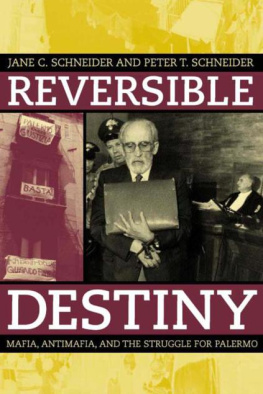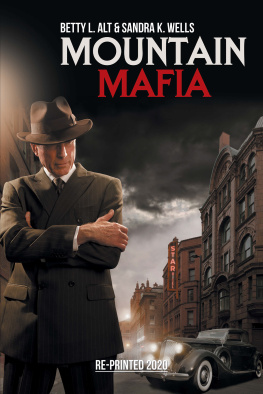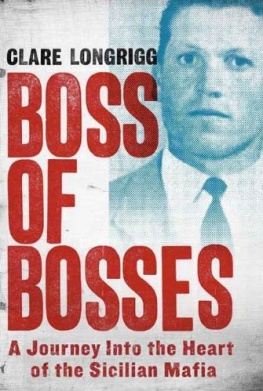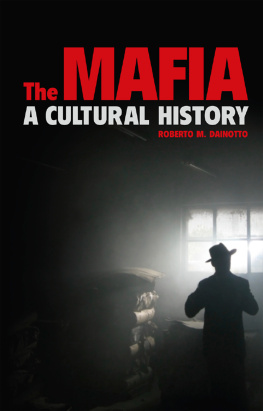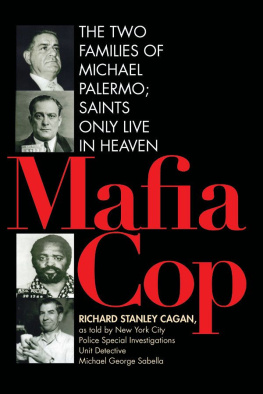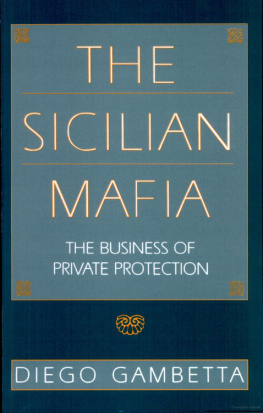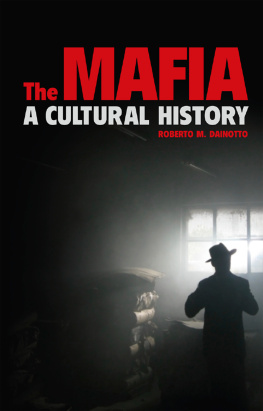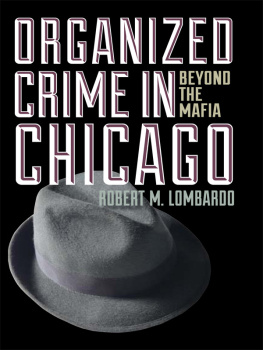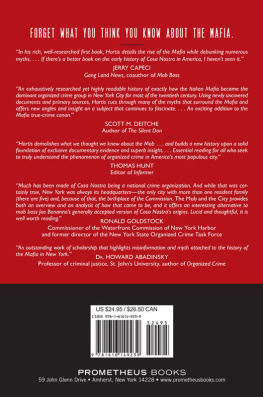



Jane C. Schneider
Peter T. Schneider




In Memory of Eric R. Wolf Scholar, Teacher, and Friend

ix
xi
xiv

i. Palermo of the popolo before 1968 7
z. Palermo of the aristocracy 8
3. The "sack" of Palermo 17
4. Giulio Andreotti and Salvo Lima 57
5. Luciano Liggio 6o
6. Michele "the Pope" Greco 61
7. Mafia banquet entertainer 97
8. Boy killed by mafiosi 104
9. Judge Giovanni Falcone 136
io. Vito Ciancimino 141
i i. The maxi-trial 142
iz. Giovanni Brusca 155
113. Plaque commemorating the assassination of General dalla Chiesa 182
14. Leoluca Orlando 185
15. Monument to the Victims of the Mafia 196
16. The Falcone Tree 206
17. The first sheets protesting the massacre of judge Falcone 207
A. The "hill of dishonor" 253
19. The "Hotel of the Mafia" 255
zo. Giancarlo Caselli 261
z1. Young boy poised with toy gun 289

We were fortunate to reside in Palermo off and on between 1987 and zooo, while pursuing the research for this book. Numerous friends and colleagues took excellent care of us-helping us locate interesting places to live, mediating introductions to public figures, answering our interminable questions. Knowing of our desire to chart transformations in the relationship between mafia and antimafia in the Palermo region, many went out of their way to contribute. They suggested books and journals to read, alerted us to events and controversies of interest, invited us to meetings and discussion groups, and included us in the rounds of their everyday lives. Perhaps needless to say, people who assisted in these ways are concentrated on the antimafia side of the mafia-antimafia equation (although we have in the past also known mafiosi in rural Sicily). We particularly want to thank Ginni Albegiani, Orazio and Nina Barrese, Letizia Battaglia, Daniele Billiteri, Raimondo Catanzaro, Augusto Cavadi, Alessandro Cestelli, Marta Cimino, Gabriella Callari, Donatella Di Natoli, Giusi Ferrara, Renata Feruzza, Giuseppe and Vivi Fici, Giovanna Fiume, Gabriella Gribaudi, Angela Locanto, Salvatore Lupo, Rosario Mangiameli, Pasquale Marchese, Wanda Mollica, Franco and Rita Nicastro, Giovanni Oddo, Letizia Paoli, Anna Puglisi, Marina and Santi Rizzo, Sergio Russo, the late Giuliana Saladino, Umberto Santino, Cesare Scardula, Paola Sconzo, Cosimo Scordato, Mary Taylor Simeti, Paolo Viola, Emanuele Villa, and Francesco Vinci.
Letizia Paoli, Umberto Santino, Mary Taylor Simeti, and Paolo Viola also read an early draft of the manuscript, corrected errors of omission and commission, and raised questions that were extremely important to our revisions. We gladly assume responsibility for the final outcome, knowing how much it has improved over this earlier version. In the United States, the following persons read and criticized the early draft as well: Michael Blim, Sally Booth, Jeffrey Cole, Marc Edelman, Shirley Lindenbaum, Sarah Munro, Ray Montgomery, and Reg Potterton. Thanks to their generosity, we were provoked to clarify arguments and consider new sources, comparisons, and analytical strategies in nearly every chapter. Julia Schneider generously (and mercilessly) made editorial comments.
We are grateful to Benjamin Orlove for bringing our work to the attention of the University of California Press and to Juliane Brand, Cindy Fulton, and Sheila Levine at the press. Two external readers, Judith Chubb and David Kertzer, both long-time students of Italy, offered extended comments, at the same time encouraging us to consider the wider implications of our case. We much appreciate their thoughtful and constructive suggestions. Finally, we thank the Harry Frank Guggenheim Foundation, the National Science Foundation, the Wenner Gren Foundation, and the faculty fellowship programs of the City University of New York and Fordham University for financial support of the fieldwork.
Reversible Destiny was essentially complete before September it, zoos. The events of that morning have cast it in another light. The Sicilian mafia, although not ideologically driven, is a secretive organization whose loosely networked "families" nurture violence. After the breakup of the French Connection in the 1970s, in the context of Sicily becoming a crossroads of global narcotics trafficking, the mafia turned to terrorism, with a rising toll of shootings and bombings directed against state power. The massacres of the Palermo Prefect Carlo Alberto dalla Chiesa in z98z, and the prosecutors Giovanni Falcone and Paolo Borsellino in 199z, provoked waves of especially intense reaction-high points in a multifaceted lotta contro la mafia (struggle against the mafia). Notwithstanding its history as the "mafia capital," Palermo, the fulcrum of this struggle, is today internationally recognized for a series of experiments in civility and legality. Perhaps, we believe, aspects of the Sicilian experience are relevant to the pending struggle against terrorism in other parts of the world.
In particular, the Sicilian experience suggests a way to frame the pending struggle in criminal justice rather than mainly in military terms. Do ing so means calling attention to the role of creative and transnational police, intelligence, and investigative work aimed at uncovering not only terrorist networks and "cells" but also the corrupt elements of states and financial institutions that give these organizations their cover. It means highlighting the role of citizens' social movements supporting this work while at the same time monitoring the unstable boundary between protecting society from violent criminality and guaranteeing its civil liberties. Finally, it means recognizing that a credible strategy must also address poverty, unemployment, and severe dislocation-and not merely as secondary concerns to be taken up when the emergency is over.
We have shared these thoughts with numerous friends and colleagues, including several of the people who are thanked above. Their responses encourage us to think that the efforts of Sicilian citizens to reverse their "destiny" have lessons to impart that transcend the struggle against the mafia and political corruption in Italy. With this book we seek to acknowledge those efforts.
Next page
